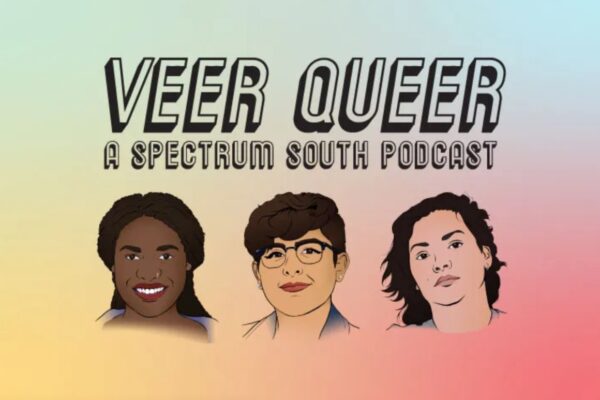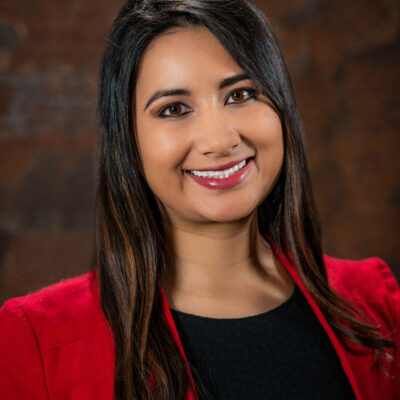June is the official month of Pride, a month that celebrates the history — and recognizes the ongoing struggles — of the LGBTQ community. Pride is also a moment to reflect on the ways that everyone can support the LGBTQ community, such as through the efforts of organizations like the Montrose Center, an LGBTQ-serving non-profit agency in Houston.
During a recent live Instagram interview, our social media followers submitted questions to Julien Gomez (pronouns: they/them), communications and marketing specialist at the Montrose Center. Julien, who hosts the “Veer Queer” podcast, discussed with us how their non-binary gender identity has influenced their work and what cisgender people need to know about the reality of non-binary individuals.
Who are you and what do you do?
My name is Julien Gomez and I am twenty-six years old and I am from Houston, Texas. I was born and raised here, but sadly I’ll be leaving in a couple of months for Austin. My pronouns are they/them, I am non-binary, and identify as bisexual. I am the communications and marketing specialist here at the Montrose Center. I also have a podcast and a dog named Levi that I love very very much. I can’t wait to do this live Q&A with y’all.
What resources and services does the Montrose Center provide for the LGBTQ community in Houston?
The Montrose center offers a myriad of services that revolve around mental health, but the main areas of services include those that we serve to youth, seniors, women, trans and non-binary people, the HIV population, and again, mental healthcare.
We offer HIV services at the Montrose center that revolve around prevention, education, counseling, and case management. If anyone is interested, they can give us a call at 713-529-0037.
The services that revolve around youth here go back to Hatch Youth. Hatch is basically a safe space where LGBTQIA youth come into our drop-in center and can be their unapologetic selves. The phone number for Hatch Youth is 713-529-3590.
Before I started working at the Montrose Center, I was a Hatch Youth facilitator, which really meant that you were there as sort of role-model for these kids. Hatch provides one hour of socializing and then one hour of group [activities], so that way you get a little bit of whatever you want from Hatch Youth. You may want to come in to socialize with other Hatch Youth kids, or maybe you really need to go in there to unpack with other kids who may or may not have the same life as you’ve had. Either way, Hatch Youth is really great and I wish it was something I knew more about when I was a young kid.
What services are there for people not in Houston?
I would check out Texas Trans Kids which is for youth ages K-12. I would also check out the Gender Infinity Resource Map; that will link you with resources in Houston and the surrounding area as well. I would also check out your local schools to see if they have any gay-straight alliance (GSA) clubs, and your local universities may also have an LGBTQ center underneath their student programming.
What do you think that cisgender/people in general should know about non-binary people?
What I would really want people to know about non-binary people is that we all live different experiences. Just really quick: AFAB means Assigned Female at Birth, and as far as what non-binary means, that depends on who you ask.
For me personally, non-binary means that I exist outside the [gender] binary. As far as how I identify within my gender, I feel that I encompass a little bit of what “male” and “female” is. Whereas there's people who feel like more [one] than the other [gender], or there's people who feel like neither. So, the definition of non-binary can really just depend on who you ask. But the bottom line, it just means that you're not cisgender, which means that you identify with the sex that you were assigned at birth.
Going back to what I was saying, for me [non-binary] means that I exist outside of the [gender] binary. I think generally people get this idea that non-binary people all look the same. Not that Ruby Rose (an actress) is not gorgeous, but I believe Ruby Rose came out as non-binary not too long ago, and I think that when people think of non-binary they look at someone like them — I’m going to use “them” (as Ruby Rose’s preferred pronoun) because I'm not entirely sure — that non-binary people are thin and white and AFAB.
I have met so many non-binary people who don't fit within that box, and I wish that there was a lot more visibility when it comes to the non-binary community. And there's a lot of reasons why people may not fight for that visibility. Like for me personally, I have the privilege to be able to do that in a place that is affirming of my gender identity, but I know people who are not in the same places I am, so I think that the more vocal that we all can be as a community [the better].
What does Pride mean to you?
Pride for me means that I am allowing myself to be out of the closet that I had kept myself in since I was thirteen, but it also means that we have a lot of work to do. So, to be the authentic self that I wanted to be, I didn't allow myself to live in my truth.
It wasn't until I was graduating from college and surrounded myself with people… to expand on that a little bit, I had known that there was something going on regarding my sexuality when I started puberty around twelve or thirteen years old. But I didn't allow myself to emulate what they were, and so I really owe a lot of who I am to my friends and my chosen family — not that I don't have family that loves me and accepts me, but I also have extended chosen family. I owe a lot of myself to them. So, I came out as bisexual when I was about 22, then I came out as non-binary about a year and a half ago.
What is the name of your podcast?
My podcast is called “Veer Queer” podcast. We center queer and trans people of color voices. You can find us on Spectrum South, and we’re also on Spotify, Stitcher, and Apple Podcast.


